Episode 5
Personality Superpowers
S03 - Episode 5
May 31, 2025
45 mins & 00 secs
Speakers
Chris McLaughlin
Soren Peterson
About
Season 3, Episode 5 – “Personality Superpowers” What makes you you—and how does life shape that over time? In this episode, Soren and Chris explore their Myers-Briggs personality types and how trauma and lived experience have influenced how they show up in the world. From opposite ends of the personality spectrum, they unpack the power of self-awareness, the role of coping skills, and how understanding your strengths can help you thrive. It’s a real, honest, and surprisingly funny conversation about embracing differences, building empathy, and finding your own superpowers in the process.
#myersbriggs #personality #oppositesattract
————————————————————————————————————-
About the Podcast: Inspired Insights is a real-talk, intergenerational podcast where hosts Chris and Soren explore the big questions around growth, connection, mental health, and what it means to show up authentically in a changing world. With curiosity and compassion, they invite listeners into meaningful conversations that spark insight, challenge assumptions, and inspire action. New episodes drop regularly—tune in for thoughtful takes, practical tools, and powerful stories that bridge generations and fuel personal growth.
https://www.youtube.com/@InspiredInsightsPodcast
inspiredinsights@inspiredcg.com
*Please note that this episode contains sensitive behavioral health topics such as suicide and substance use. If you are experiencing a behavioral health crisis, please contact the 988 Suicide & Crisis Lifeline by calling 988 or visiting www.988lifeline.org.
**This podcast is for information and entertainment purposes only and should not be considered health advice. This podcast is not intended to replace professional medical advice.
Transcript
The Inspired Insights podcast is for informational and entertainment purposes only and should not be considered health advice. This podcast is not intended to replace professional medical advice.
Please note that this podcast may contain discussions on sensitive topics such as mental illness, suicide, and substance use. If you are experiencing a behavior health crisis or need support, please contact the 988-SUICIDE-AND-CRISIS-LIFELINE by calling 988 or visiting www.988-LIFELINE.ORG.
Chris:
Welcome back, Soren.
Soren:
Welcome, welcome.
We’re here. Another episode of the Inspired Insights podcast.
Chris:
I know this final season, all the feels are happening for me as with every episode we get through. I’m just like, things are happening. It’s real.
Soren:
Yeah, things are coming to an end or a new beginning.
Chris:
Or a new beginning for both of us. Inspired Insight of the Week.
Soren:
Oh my.
Chris:
I know, right on the spot. Do you want me to go first?
Soren:
Yeah, go for it.
Chris:
Go for it. So I’ve been reflecting a lot lately on this idea of legacy. And I’ve been doing some traveling and really doing a lot of social work stuff, conferences and guest speaking and presentations.
And my Inspired Insight is a bit wobbly because I’m forming it in real time. But it has to do with this idea of how our human drive for evolution and our human drive to pass things on. And for somebody who has elected to not have children in my life, the role that my career has played over the last 25 or so years to supplement itself as a child.
And so as I watch your family go through these transitions with you and your brother and what’s coming up and where developmentally my career might be if it were a living, breathing human. I don’t know. There’s just so many parallels I’ve been thinking about with this concept of this career as a child.
And as I move this career out into the world, hoping it will eventually take care of me and provide for me as well. I’m just struck by our drive as humans for legacy and for passing things forward and for leaving our mark on the world. And in the absence of genetics, what role does my social work career and potential, what’s the legacy that I’m driving for around that?
And how do I leave my mark on this planet, making sure that I’ve left the planet better than I found it?
Soren:
Yeah, I think that’s a super interesting thing to think about legacy, particularly because in my eyes, obsessing over one’s legacy is kind of inherently irrational as a result of our inability to view our own legacy posthumously. So we’re attempting to produce something that can exist externally from us. But when it exists externally from us, we are no longer capable of deriving value from it, which is very much like having a child.
Chris:
Right, right, right. And to your point, depending on one’s belief systems, we may or may not ever know what that mark was. But I think about those developmental phases, that Erickson kind of stuff, and I’m solidly in or approaching this whole stagnation versus generativity around looking retrospectively backwards, redundant I think, on what’s my mark?
What’s my mark been? Has my life been productive?
Soren:
As you look back upon your life, I’m just curious, do you feel that you’re feeling like it’s sort of coming to an end? You’re wrapping things up. And what does that feel like, dealing with your own mortality, as legacy is sort of an inherent thought about one’s own mortality?
Chris:
Yeah, yeah, that is a very interesting question. As somebody who turned 50 six months ago, so I’m 50 and a half, there is a whole lot still ahead. I fully believe that our best days, including my own, are still ahead.
And if I live to be 100, I’m at the halfway mark. I have a strong family history genetically. All sets of grandparents lived in their 90s, and I still have a grandmother alive well in her 90s.
I still have both my birth parents alive. And so that idea of mortality probably hasn’t crossed my mind yet. And we have no way of knowing what the world is going to look like 50 years from now and what the how our human age is being preserved beyond a typical life.
I don’t even know what the current life expectancy is.
Soren:
I think for men in the United States, it’s 78. And for women, 7. Higher or lower?
Higher. Yeah, it’s always higher for women.
Chris:
Yeah, so I mean, that’s 30 years from now. So yeah, I guess I am starting. And I don’t want to be working and grinding at the level I feel like I am currently or as your mom accuses me of all the time.
I don’t want to be doing that 20, 30 years from now either. And so that building in time for rest or reflection later. Yeah, I guess I am kind of facing down a top-up mortality.
Soren:
I didn’t mean to suggest that you were getting like old to the point where you’re looking down the barrel of the gun, but yeah. So moving on to my inspired, yeah, let’s hear it. Also talking about like this idea of aging and development.
Although I love all of my friends and I think I’ve managed to kindle really fantastic relationships with the people around me, I feel like I’ve sort of begun to develop a little faster, a little past some of the people that I once surrounded myself with as individuals who are very much on the same wavelength as me. And I feel like at this point in my life, I’ve sort of started to depart from that sort of teenage outlook. And a lot of my friends are still in that teenage outlook.
So internally, not really externally in my interactions, but internally it creates a little bit of friction for me as I sort of start developing past my current relationships. And I think it’s something that’s very interesting to think about as I am ready to move on. I’m at a point where I’m just over high school.
Like it’s not something that is drawing my attention anymore. And I think a lot of the styles of relationships that I see in high school that I once looked up at, thought were very cool, chic, whatever, I’m now beginning to feel a bit distasteful to me. Which is just, I think, a very interesting transitionary perspective that I’ve sort of adopted as I’m starting to not…
I feel bad for saying this, but I feel like I’m, to some extent, internally delegitimizing my relationships.
Chris:
Can I ask you a question? Yeah, go for it. At the risk of transitioning this into…
You gave me a therapy session a couple minutes ago, I’m going to give you one. How much of that process that you’re going through has to do with the fact that you’re leaving the country in a couple months and may not be back here for several years? So how much of this is anticipating the separation that’s coming?
Soren:
I think as I’ve moved through my high school career, I have started to view relationships and emotions and situations as increasingly transient. And I definitely think that my soon-to-be-living-in-another-country is contributing to that as I’m starting to view the setting around me, not as a permanent fixture, but as something that is temporary and soon-to-be-removed. So I think it’s certainly contributing to it.
However, I think the primary contributor is my own personal development, external from where I may be geographically in the future.
Chris:
Well, that’s… I mean, I think back all the way to season one and we had that whole work-in-progress sign behind us, right? That we are all works in progress and we’re all constantly evolving.
And I can’t remember the exact quote, but there’s a kind of a well-ish known line that goes something like, you know, people come into our lives for a reason, a season, or a lifetime, you know? And there are relationships I’ve made in my life, even as an adult, that there was a pretty specific reason why that connection happened. And when that reason transitioned, the connection kind of faded or fizzled away.
And that’s not to minimize the relationships we’ve made across our life, because every one of those relationships is important and is valid and you’re growing, we’re growing. And when I’m 80-something years old, I may have very different needs and the relationships I surround myself with at that point in my life are probably going to look really different than the relationships I have now. That doesn’t mean I care any less about those people.
It just means that we’ve transitioned, we’ve grown, we’ve evolved. And sometimes evolution isn’t always looking for something better. Sometimes evolution is that season is changing and we need something different.
Soren:
I think actually a sort of spectrum that I’ve identified in relationships that I find very interesting and that you’ve identified regarding the season to lifetime is I feel that relationships or the basis for them exist on a continuum from context to compatibility. Lifelong relationships, I feel, are based upon basal personality compatibility, just a human being that you thoroughly enjoy. And then a lot of our season relationships are dependent upon context.
It could be a social setting that you found yourself in due to school, and you may not necessarily mesh on a compatibility level with a lot of individuals there. However, you may share similar interests, and as a result of that, that becomes your friend group. And I think that a lot of my relationships earlier in my high school career were exclusively context-based rather than compatibility-based.
I was seeking out individuals who were going to enable and engage with my mental illness. And now a lot of my relationships, I feel, are based far more heavily on compatibility as I’ve sought out what I see as more genuine, legitimate relationships.
Chris:
Yeah. Yeah. I think you’re right where you’re supposed to be, Soren, really.
As you reflect on this, it kind of ties back to this idea of legacy that we were talking about just a bit ago, and this retrospective look. When I think about who I hung around with in elementary school, in middle school, in high school, in college, and beyond, some of it was proximity. Some of it was the relationships my parents had with their parents.
And as we grow, it might shift from geography to interest and shared, the compatibility between humans. And then it maybe moves to geography again, like school, work, who you’re surrounded with. In your case, who’s in your dormitory?
Who’s your roommate now? And you meet these different people and friends. And part of that retrospective look back for me is just pausing to just give thanks to what I got from those relationships every step of the way, even though I may not have seen some of those people for 40-something years now.
We get information and we learn about ourselves in the context of these other relationships we’ve made.
Soren:
I actually really like that comment, in that it is sort of like, I like this idea that it is impossible to discover oneself without examining the way oneself interacts with the world around them. Self-discovery as an internally derived thing, I feel, is sort of non-existent. I cannot sit and think and truly gain an understanding of myself without having a canvas, that being the world, on which to paint my personality.
Chris:
Right.
And humans have an innate need to belong for a community. It’s part of that whole Maslow, the scale, the triangle, I mean. Belonging and love is squarely in the middle of that triangle, which assumes that when our basic needs are met and our safety needs are met, we then are open to forming relationships and being part of community and belongingness.
As introverted as anyone is, they still have a need to belong. Maybe their circle is a bit smaller or more selective, but that need is still the same. And so as we all advance through our lives, and as we learn to take care of some of those physiological and safety needs for ourselves, then we start exploring what community and belonging means for ourself.
Soren:
100%.
Chris:
Yeah. Yeah. Whoa.
Soren:
Concluding our Inspired Insights portion of the podcast.
Chris:
But it’s a nice transition, right? Because we were also kind of reflecting before we started recording on the concept of personality and needs and navigating the world, and a little bit of like, how do we as humans get so entrenched in our way, being the right way, and we had some laughs. Maybe we’ll recreate some of those moments.
But we were talking about Myers-Briggs. And so for our listeners who might not be aware, and we’ll put some links and pieces for folks to learn more, the Myers-Briggs Type Indicator, M-B-T-I, is a very well-known personality test, as you folks can find it on the interwebs. And it’s a series of questions that evaluate your preferences on four dimensions.
And so we have the dimension of our focus around the world. So introvert versus extrovert, I or E. We have the dimension of how we take in information.
So sensing versus intuition. We have the dimension of how we make decisions, thinking or feeling. And then how we live our outside world, judging versus perceiving.
And that’s probably the letters that are most confusing for folks. And we’ll describe a little bit this way. And I just want to say, I am no expert in Myers-Briggs.
It’s an inventory I’ve done dozens of times. It’s often used in office settings and in res life, residential life, college settings, to help develop some shared empathy, shared perspective taking on how other people around you are wired. And each of these personality types, of which there are 16, these four dimensions in every possible combination, gets you 16 different types.
And each type has some strengths. And each type has some maybe more Achilles heels, things to be watchful of. So we were having some fun.
We’ve got cheat sheets here. We were having some fun with your mom before we started, just kind of assessing where we are on the Myers-Briggs. So again, I’ve taken this test dozens of times.
I am an ESFJ, so extrovert, sensing, feeling, judging. And again, we’ll talk about that JP, because that’s, I think, where it gets more confusing for folks. I, and when you take the inventory, depending on the ones you’re taking, it’s the level of strength, like the degree of which you rely on these four dimensions.
Of my four letters, the J is the strongest. And that J really is more about organization, planfulness, consistency, calendars, Post-it notes, alarm clocks. Those are all the images of the J that come up.
You are an ENTP, extrovert, intuition, thinking, perceiving. Almost the total opposite. We’re both extroverts.
We’re both extroverts. And even extroverts need time to just sit with ourselves, right? So we may get our energy from others in our space.
And the Achilles heel of that is, how do we bring ourselves down and just sit with our own thoughts?
Soren:
Yeah. Regarding my specific brand of extroversion, I used to have a lot of difficulty unwinding from positive social settings without emotionally crashing hard.
Chris:
Yeah.
Soren:
Like, for example, one of my attempts was directly after having a lovely evening with my parents. That was very positive. And then I had a really fun phone call with one of my friends.
That was also extremely positive. And I got a lot of energy from that. And then when you feel the absence of that energy and the sensation of aloneness starts draining you, that’s what I had a lot of issues with.
And I think through my recovery, I’ve not become an introvert by any means, but I have become less of an extrovert, certainly.
Chris:
Yeah. Maybe you appreciate more of those introverted moments. A hundred percent.
Yeah. I’m curious for you. So theater, movies, amusement parks, those things that might happen in the evening, it takes me, because I’m just sitting in the buzz and the hum around me, if I get home from a really cool Broadway show or musical or concert that ends at, what, 10, 30, 11 plus at night, it will take me hours to then come down from that energy and sleep.
My husband on the other end of things, and he will be the first to say, and I can hear him now as he’s editing this episode, he’s an extrovert and he’s not. He’s an introvert. And he can shut down and take a nap in the middle of Disneyland, in the middle of a show.
Soren:
I’d be incapable of that.
Chris:
Because we are soaking in that energy. And so I think sometimes the introvert extrovert discussion gets a little stigmatized, that introverts are seen as not social and extroverts are seen as go, go, go, social, social. And it’s really more about energy.
Soren:
And I think that’s really important.
100%. I think it’s important to differentiate that it is about energy too, because a lot of introverts are extremely socially outgoing individuals that are capable of carrying on an extremely energetic conversation for long periods of time, interacting with others for long periods of time. Absolutely.
It just slowly becomes draining for them, whereas for us, it recharges our battery.
Chris:
100%. That’s Derek. Derek can talk about a multitude of random topics, and knows a lot about those topics, and be energized and jazzed in that conversation, and then the crash comes.
I’m the opposite. I’m energized in those conversations, and the hum is still buzzing through my brain and body, and it takes a while to then come down. Like you, I’m learning to lean into my more introverted opportunities, and as extroverts, we need those reminders to hit pause and do some of that recharge time.
And then the other dimensions that I want to get to the J and the P, because that’s where you and I are, I think, most opposite, and we’ll get there, but the intuition versus the sensing, for me, I’m almost on the line there. Feeling versus thinking, I think, is another big difference between you and I, and I’m thinking about the conversations we’ve had here in the studio about the role that trauma plays and how we intellectualize the world around us, and I’m wondering if, not for you, Soren, but for humans, how might trauma impact the Smyers-Briggs, these different dimensions, and our ability to sit with feelings or sit with thought?
Soren:
I think, putting aside me specifically for a moment, trauma, as we’ve discussed previously, can have an extremely pronounced impact on our personality and the way that we view the world and the means through which we process information. The way my trauma or my process of recovery, I feel, manifested within me is it made me sort of hyperlogical. I now conceptualize the world almost exclusively through thought.
And before, I put the Smyers-Briggs personality to the test before my trauma, and I was a feeler rather than a thinker, and now I’m very much a thinker. And I think part of that is I’ve sort of dissociated my thought from my emotion and tend to disregard my emotion, not disregard rather, but view it as an entity which needs to be maintained rather than one that should be the basis for my action.
Chris:
Yeah. Well, in this dimension, it’s all about decision-making. And so you come to decisions through the intellectual process.
My preference for decision-making is weighing in how it feels for me. And what’s interesting is as I get more involved in my own student, being a student in my doctoral social work program and being a professor, I’m more driven to the facts, to the research. What does the research say?
What’s out there that’s not just anecdotal but really empirical, evidence-based? And so moving myself on that slide ruler a bit towards the T as well.
Soren:
Yeah. I think I am very much similar to you in that aspect. I am highly skeptical of information.
And actually, before this episode, when we decided to incorporate Myers-Briggs into it, I was quite skeptical of Myers-Briggs. And I think it’s important to note that there’s not a massive amount of legitimate research backing up the claims of Myers-Briggs personality tests or their utility or efficacy in given situations. So I was highly skeptical of featuring it heavily in this episode.
However, I think it is a useful tool.
Chris:
Yeah. And for me, it’s a great conversation starter and building just understanding. So again, with the introvert and the extrovert, if I’m in an office setting or a dorm setting and all of the people around me are introverts and I’m the only extrovert, in order to be really successful in those relationships, I’ve got to respect their need for some…
My energy might be big and loud at times. And vice versa, right? An introvert might want to be thoughtful about how to engage successfully with extroverts, being mindful of their own energy needs, and how to adjust in the moment and ramp up.
Soren:
Yeah. It’s certainly useful as a systematic tool for empathy.
Chris:
So let’s talk about JP or PJ. Though I am all the way, Jay. I fully acknowledge, again, alarm clocks, post-its, to-do lists, schedules, order, labels on boxes, and books on my bookshelf that are very ordered and all aligned in the same way.
That’s my preference for how I organize the world around me. When I talk to you about post-its, to-do lists, schedules, alarms, you almost have a visceral reaction to it. I can see it.
You’ve started cracking your knuckles. You’ve started tensing up.
Soren:
Yeah. I feel like I react very negatively to constraints and very positively to chaos. I thoroughly enjoy chaos as something that brings me a lot of positive emotions.
I feel that plans… I despise plans. I feel that they have a tendency to limit our agency as humans.
We are deciding a course and then electing to continue on that course almost blindly without examining situations as we go. For me, planning is almost like making decisions without complete data.
Chris:
Oh, you are such your parents’ child. So why we started talking about this in full disclosure is you and your family, the four of you, have a giant trip coming up, and you’re going to be out of the country and exploring lots of cool stuff. And you, as a family, pride yourself on traveling as light as possible, traveling with…
as long as you know what time to be at the airport and where you’re sleeping, you’re going to have a great time. And that stresses me out. And I’ve been joking with your mom about this for literally months now.
It stresses me out. And I’m not saying, although I am saying there’s a right way or a wrong way, although I am. It’s fascinating to me from an understanding and empathy, which has inspired insights all the way.
It’s fascinating to me how what… because it’s not even a preference. What brings you joy and your outlook on life can be so opposite for me and folks like me, who…
I’m the guy, when Derek and I got married, I made an itinerary for every guest that told them when they could be on their own and when we needed their time and attention, of which your parents were at our wedding. And I know now that totally killed your parents’ experience in the country we were at for our wedding.
Soren:
I’m sure they still had a lovely time. But I do feel like for me, like my emotional response to plans, orders, like a set regimen of activities is quite visceral. I react very negatively to that.
Chris:
Yeah.
Soren:
And to some extent that is to my detriment, as I’m largely incapable of completing the work that I have to. However, I do feel that living a life that is planned out by you beforehand is sort of neglecting a core aspect of the human experience. And that is spontaneity, riding by the seat of one’s pants, and this joy that comes from the chaos factor of life.
Chris:
Okay, now take the reverse. So what I think is a useful exercise in this conversation is when I think about the Achilles heel, we talked about introvert and extrovert. I will acknowledge, I can acknowledge that the Achilles heel for me as a Jay is that not taking the time to smell the roses and be spontaneous in the moment may result in me missing opportunities for joy and pleasure and excitement.
And if I’m focused on the to-do list on my vacation, what I also know is some of my favorite travel memories with my husband and loved ones are the moments we didn’t plan for. So I can fully acknowledge that this well thought out, planful checkmark to-do list exposes me to the potential of missing some of the best stuff.
Soren:
And yet it also mitigates risk far better than my approach to travel.
Chris:
And I am a very, and your mom will say this, I’m a very risk adverse human and professional. Now I want you to flip it. Your Achilles heel as a P might be?
Soren:
As I said previously, I’m not planful. I’m bad at managing my time. There’s a far higher likelihood that I will be in a pickle, a pinch as it were, than someone who plans regularly.
Like an example of this, and I think a lot of this is more related to my particular brand of neurodiversity, which additionally contributes to my desire for chaos. An example of this being to my detriment is A, my schoolwork, and B, the fact that I’ve run out of gas many times. In my short career of driving, I’ve ran out of gas three times.
Chris:
And who else in your family runs out of gas at least once a month?
Soren:
Not once a month, maybe once or twice a year. My father.
Chris:
Absolutely. You are your parents’ kid. So that’s a great example.
Yet last evening, I was flying up the highway from our state capitol, having been late, having had to reschedule my entire afternoon because I was at a legislative meeting that ran way, way, way late. And every half hour that my schedule is sometimes scheduled, with each passing moment, I was needing to reschedule the next person. On my way to Augusta, our state capitol, I noticed that, oh, I’m not going to have enough gas to get all the way back home.
I don’t have time to stop now. That’s going to have to be the first thing I do on the return trip back. Because running out of gas on the is 98% of the reason why I’m a AAA member.
100%. It’s 99%. Why?
On the way home after that, I had to jump on another meeting while I was commuting. It was pouring rain. The level of anxiety rising in me as I realized trying to do the math on the highway of what exit can I get to, I got down to, I think, 13 miles left.
It says how many miles left to empty. Here’s another difference between you and I. That display on my dashboard is my default display.
How many miles left on that tank of gas is 100% of the time the display, not how fast I’m going, not my tire pressure, not whatever the other bells and whistles are. It’s miles left. That’s how jay I am.
Soren:
I think an important differentiator here is the adverse reaction to being in a situation in which you need to rapidly respond to a crisis. Every time I’ve run out of gas, it has been amusing for me. The adventure.
Yeah. I felt positive emotionally, which feels really odd to say. But when I’m in a situation in which there’s very few ways out without a little bit of chaos, I find it enjoyable.
Whereas you have a really high degree of anxiety around situations in which you need to think fast.
Chris:
Yes.
Soren:
Whereas I thrive on that sensation. It excites me to respond to issues. Whereas for you, you’d rather mitigate those issues before they need response.
Chris:
To that point in my car, all the time, I have a bag that is slippers, socks, hat, mitten, scarf. All the time. I have a bag that has some dollar bills and like change.
Should I need change? Because I don’t carry cash. Who carries cash?
But I have a little bag of cash just in case. I have another bag that is all hygiene-related stuff. Should I be somewhere and need to access fingernail clippers or a nail file or any number of other things?
Oh, and then I have the car bag that has the tire pump. I don’t even know the names of all these things. The first aid, the CPR mask, it’s got that in it.
Oh, the tire pressure gate, the little thing that you put it in, the thing shoots out. I don’t even know the name of these things. I have a bag for everything in my car at all times.
As you say this, I- Are you freaking out?
Soren:
No. I think it’s a little funny because I also have all of these things in my car, but how they ended up there is different. I have a lot of disorganized, dirty clothes that I took off my sweater at school maybe and then left it in the back of my car.
My car is a treasure trove of random shit. I just pulled the money out of my car because we were dropping it off to get fixed earlier today. I had like $45 in crumpled ones from tips from work.
Chris:
Yeah, but you didn’t even know were there.
Soren:
They were there though. I have all these things except I did not plan for them at all and all of it’s chaos and a mess.
Chris:
And it’s only in there because you forgot to take it out. Precisely, yeah. One of my favorite kill time activities is a trip to Staples.
I love the idea of school supplies. I love the idea that wall in the back of our Staples that is all the different size containers and holders. Dream.
I could just stare at that and envision, oh, I could use that to organize my friendship bracelets. I could use that size to organize all of the affirmation cards I’ve been collecting and never use because I want to plan more than I actually want to use them.
Soren:
Regarding school supplies, I personally lost all of my school supplies that we bought for this year of school within a month and a half. And now the only pencils that I use are golf pencils that I get from my AP Calc class for free. And they’re just stuck in my pocket still because I forget to take them out of my pants pockets.
And I walk to school with pants on and, oh, look, there’s a golf pencil in there. I can use it.
Chris:
So here’s my question as we think about what’s ahead. How will you transition some of your current preferences for the world around you knowing that in a couple months you are going to be six or seven hours ahead of East Coast time zone with classes that may start at 8 a.m., with homework that needs to be done? And as an adult, your parents can’t call your professors and remind them that, yep, you’re on it, you’re getting work in, can Sorin have an extra day, or you know where I’m going with that.
What’s the plan?
Soren:
Um, you know me, I don’t have one, but on the plane ride to Scotland, I think the I already have developed some strategies to sort of mitigate my inability to complete work efficiently. And I think this is really useful for a lot of kids nowadays, because high school in the United States, or at least my experience in high school, is that passing in work late is kind of the norm. Like, it’s not that much of a detriment to me to pass everything at the end of the course.
Chris:
Yeah, the expectations have got a little loosey-goosey. The guardrails are a little bit more like flubber on the hive.
Soren:
So I think part of the strategy in getting yourself to do work is like sort of convincing yourself to be panicked.
Chris:
Oh, interesting.
Soren:
Right. Like, I need to intentionally create anxiety for myself.
Chris:
And channel it.
Soren:
In order to motivate myself to do anything. Sorry, that’s fascinating. I innately have zero anxiety about anything ever, pretty much.
Chris:
So the deadline, the pressure, it’s more than pressure, isn’t it? The crisis is your fuel to perform.
Soren:
Yeah. I need to build up in my mind an idea of crisis as well. And then I think rationally, I’m like, this isn’t a big deal, I’ll just do it in school or something.
But in order to convince myself to put any effort into anything that I don’t enjoy as an activity is to produce an internal crisis about it.
Chris:
That’s fascinating. It’s a great plan. I’m not being sarcastic.
It’s a great plan. This is you knowing you and knowing what works for you as you transition to your next era of how to be motivated, how to drive and set yourself up for success. And for you, knowing that you thrive in this environment, it might be creating some of this environment to thrive.
Yeah. My plan is I will schedule time in my day, every day, to not be scheduled. I’ll have a block on my schedule that is just, I’ll have to, we’ll come up with some acronym, this time.
But it will truly be a time to just sit with thoughts and not think about productivity, not think about the wallet staples, not think about reorganizing my bookshelf. It will be planned spontaneity.
Soren:
I like that. A little bit of an oxymoron. But the panic inducing productivity is a little bit oxymoronic as well.
Chris:
It’s panic planfulness.
Soren:
Wow. Beautiful.
Chris:
Soren, I want you to know that I accept every ounce of your spontaneity and lack of planned approaches to life, even though it drives me nuts. I see you, I respect you, and I accept you.
Soren:
Wow. I love your planfulness as it allows for this show to be produced. What I’d like to leave our audience with as they digest a little bit more about us is what we’ve done here.
We’ve identified certain personality traits about ourselves, and through that self-discovery, we have enabled ourselves to fabricate coping mechanisms that adapt for those things. It’s essential that we discover ourselves in more categorical terms in order to create coping mechanisms that work for us. And I would encourage our audience to maybe take a personality test, maybe try to spend a little bit of time thinking about how you respond to the environment around you, categorizing your behaviors in order to create coping mechanisms and tools for yourself to succeed better in the future.
Chris:
And seek feedback.
Soren:
Yeah, 100%.
Chris:
I think that’s how we grow as humans, is get beyond our own opinions and thoughts about ourselves and ask trusted friends, family members, loved ones, and seek feedback and be just able to sit with it and grow with it.
Soren:
100%.
Chris:
Well, Soren, until next time…
Soren:
Until next time, this was the Inspired Insights podcast. Thank you so much for listening.
Chris:
I’ve been Chris McLaughlin.
Soren:
This has been Soren Peterson. We’ll see you next week.
Chris:
See you next time.
Soren:
Bye.
Show More
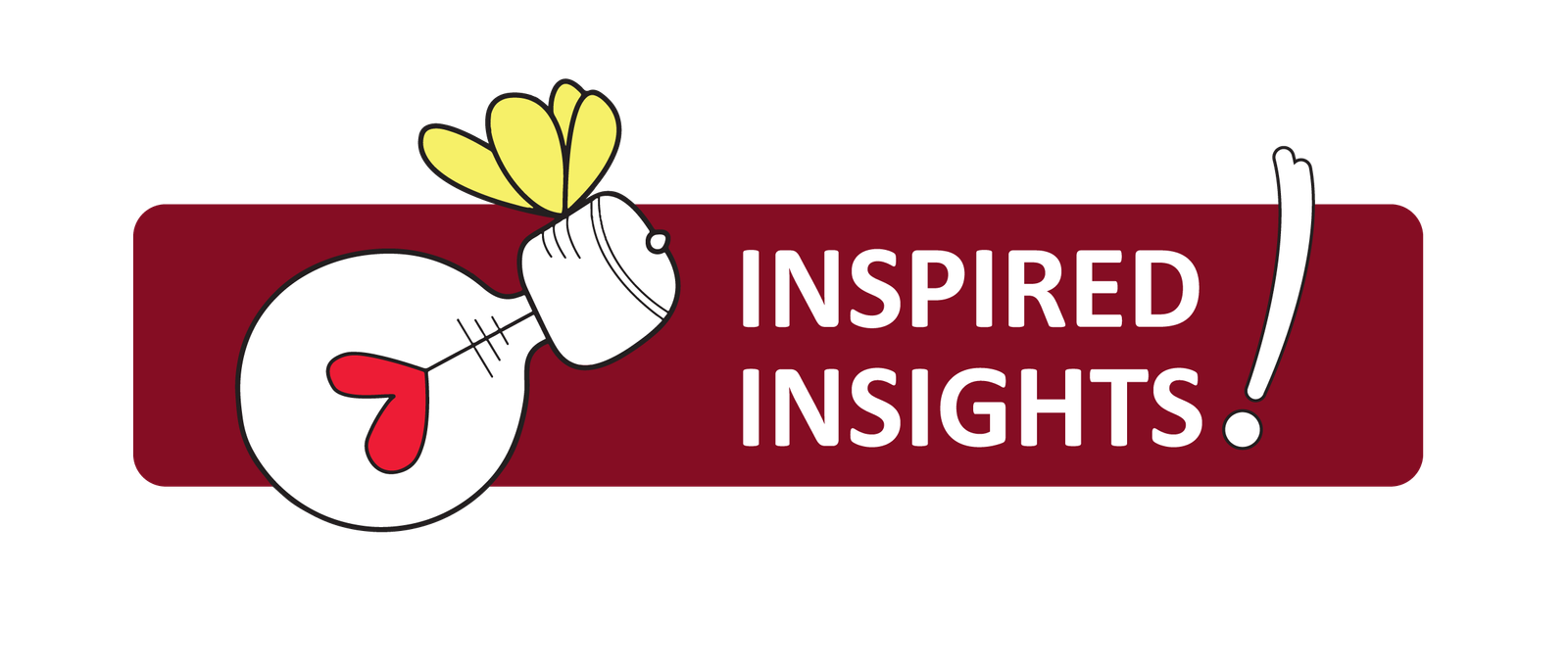
All Episodes
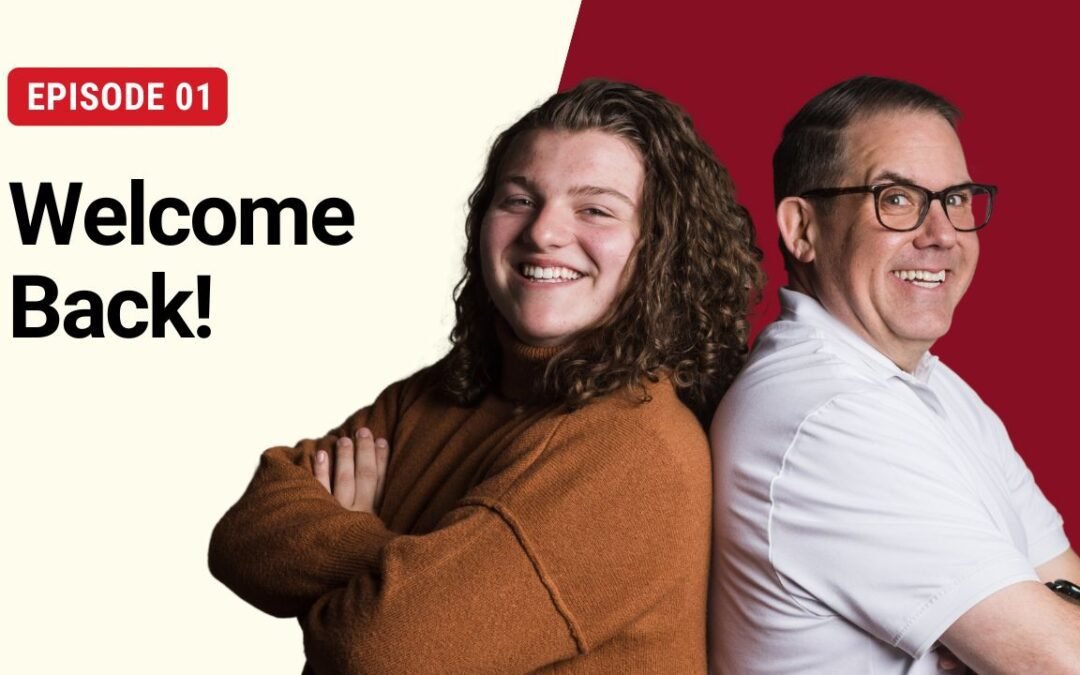
S3E1: Welcome Back
Welcome back to the Inspired Insights Podcast for the very first episode of Season Three! Join hosts Chris and Soren as they dive into a heartfelt conversation about the evolving world around us–and within us.
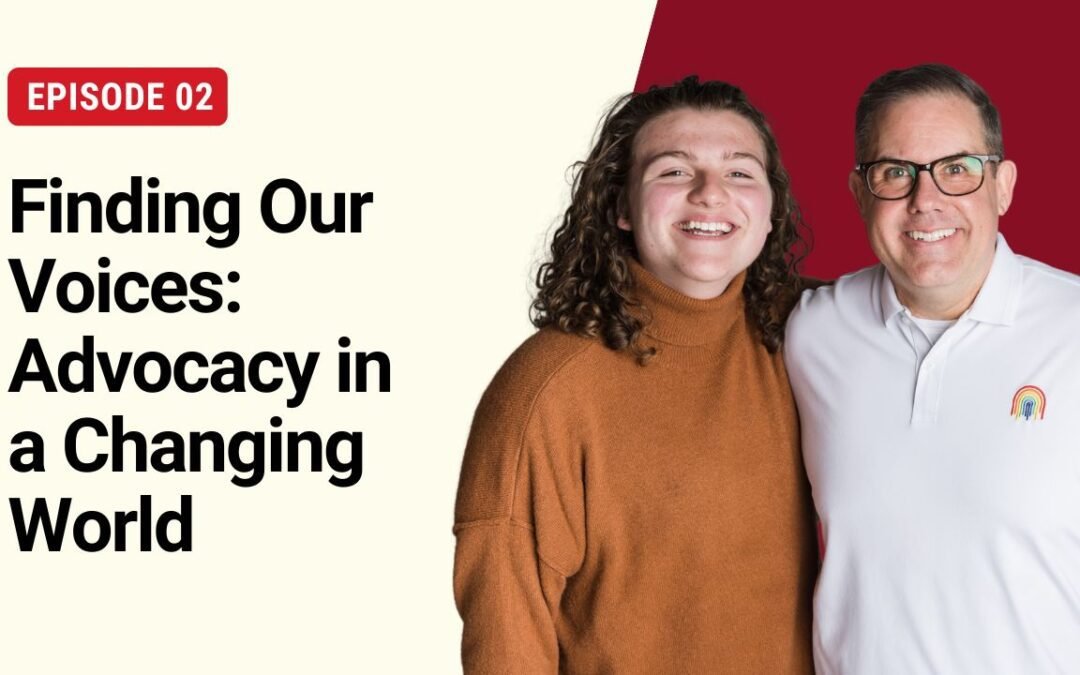
S3E2: Finding Our Voices: Advocacy in a Changing World
Chris and Soren sit down with seasoned lobbyist and tireless human rights advocate, Charlotte Warren, to explore the power—and the personal cost—of advocacy in today’s shifting political landscape.
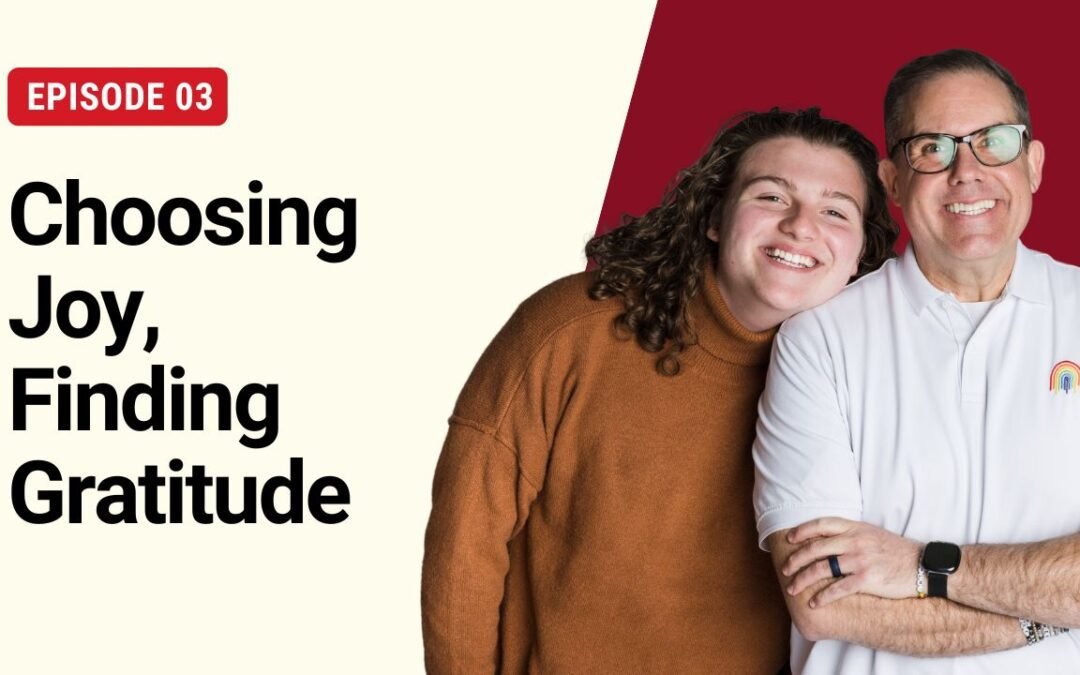
S3E3: Choosing Joy, Finding Gratitude
Chris and Soren unpack how reframing our thoughts can change the way we experience the world—from the inside out.

S3E4: The Power of Storytelling
Chris and Soren sit down with Authenticity Coach and Author Suzanne Carver to explore how sharing your story—and embracing who you truly are—can open doors to healing and transformation.

S3E6: The Power of Pride
Together, they explore the deeper meaning behind Pride celebrations—why they matter, how they foster connection and visibility, and what it really takes to bring a community-wide event like this to life.
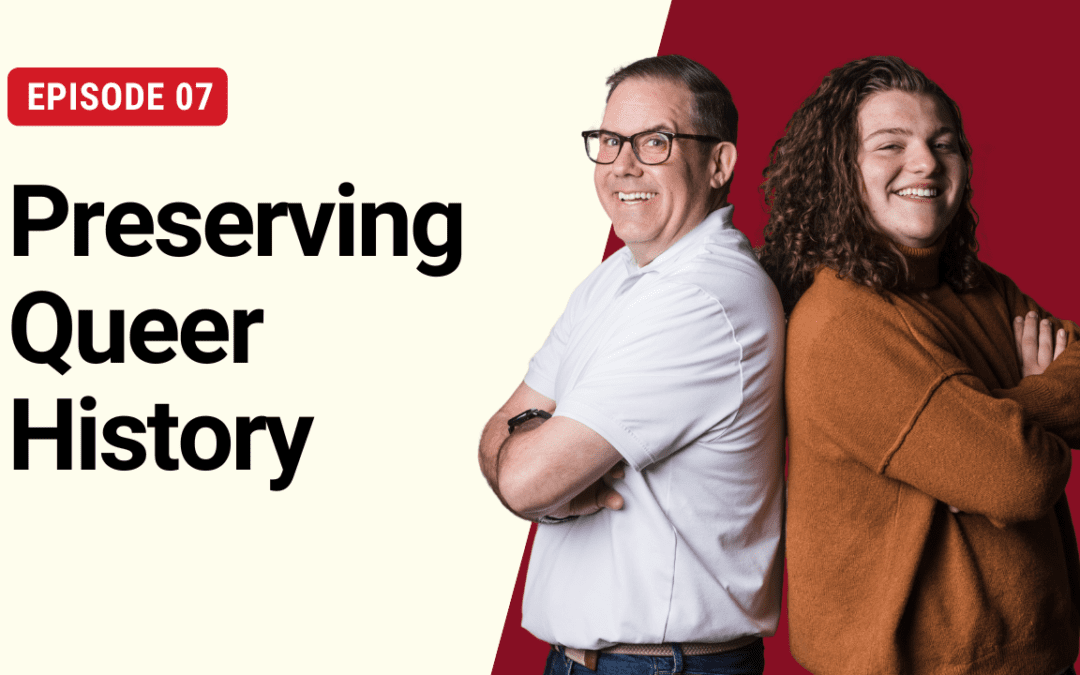
S3E7: Preserving Queer History
Soren and Chris sit down with special guests Sam and Emma to explore the vital importance of preserving queer history through storytelling and community memory.
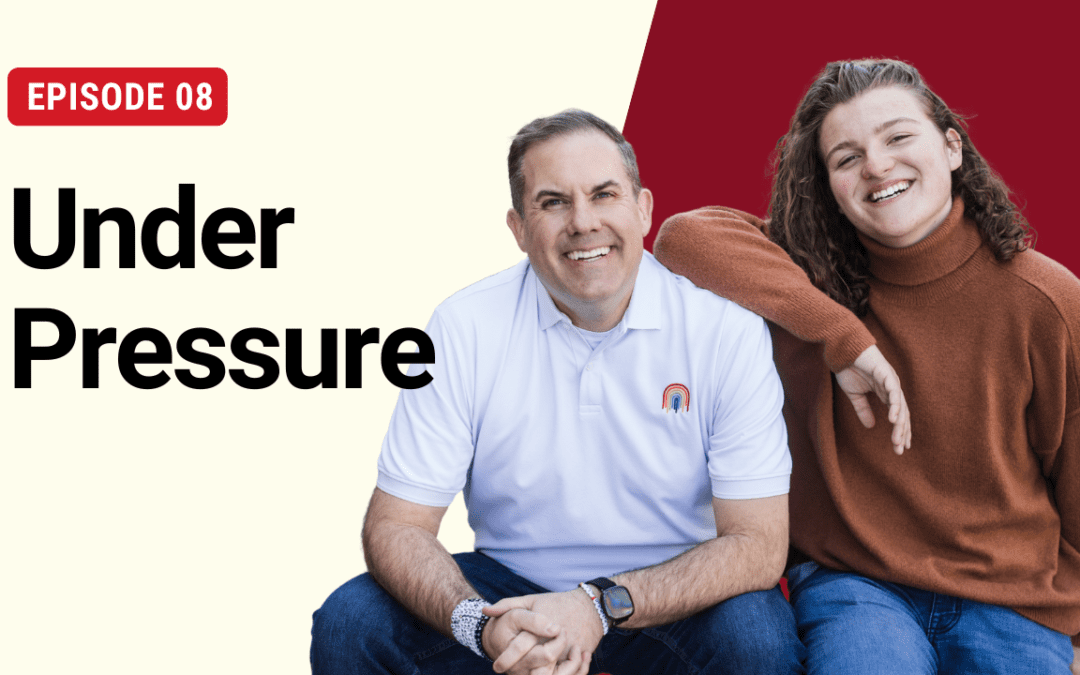
S3E8: Under Pressure
What happens when we let teens speak for themselves? In this candid and eye-opening episode, Soren and Chris hand the mic to two remarkable young adults—Sophie and Bennet
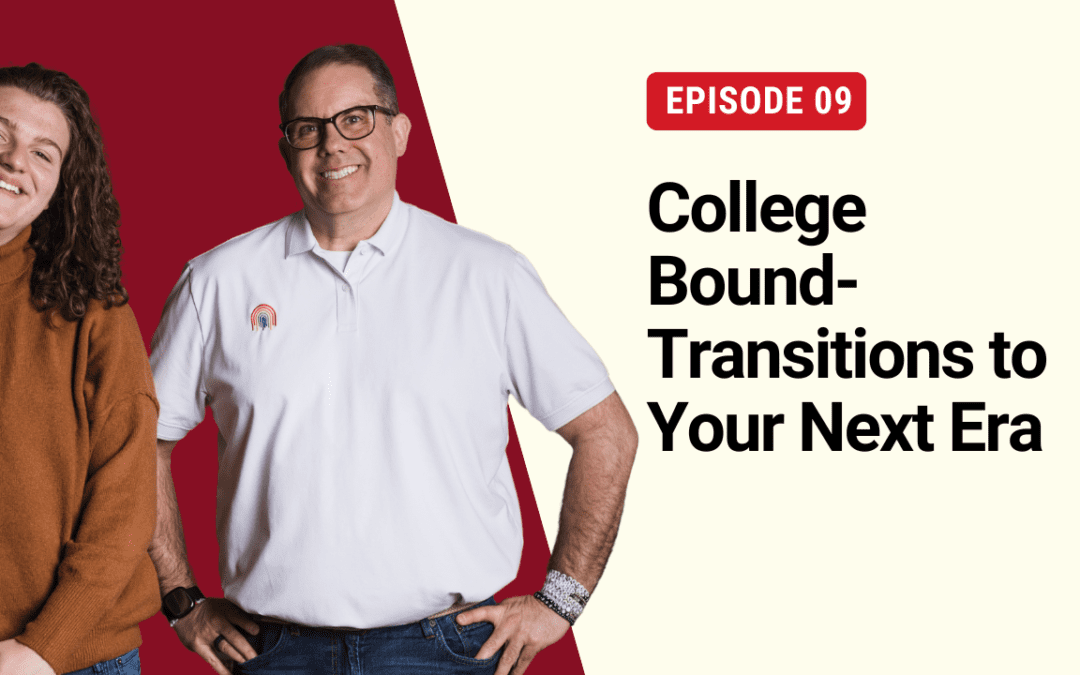
S3E9: College Bound: Transitions to Your Next Era
Soren and Chris sit down with two student life experts, Angela and Andi, to explore the powerful transition from high school to college—and how it reshapes community, mental health, identity, and daily life.
